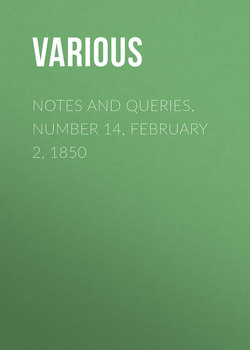Читать книгу Notes and Queries, Number 14, February 2, 1850 - Various - Страница 1
NOTES
ENGLISH AND AMERICAN REPRINTS OF OLD BOOKS
ОглавлениеMost people are aware of the great demand there is for English literature, and indeed for all literature in the United States: for some years the anxiety of persons in that part of the world to obtain copies of our early printed books, prose, poetry, and plays, has been well known to such as collect and sell them on this side of the water. Where American purchasers could not obtain original editions they have, in all possible cases, secured reprints, and they have made some themselves.
Not very long since a present of a most creditable and well-edited republication of "Four Old Plays" was sent to me from Cambridge, U.S., consisting of "Three Interludes: Thersytes, Jack Jugler, and Heywood's Pardoner and Frere; and Jocasta, a tragedy by Gascoigne and Kinwelmarsh." They are preceded by a very well written and intelligent, and at the same time modest, Introduction, signed F.J.C., the initials of Mr. Francis James Child; who in fact was kind enough to forward the volume to me, and who, if I am not mistaken, was formerly a correspondent of mine in a different part of the republic.
My particular reason for noticing the book is to impress upon editors in this country the necessity of accuracy, not only for the sake of readers and critics here, but for the sake of those abroad, because Mr. Child's work illustrates especially the disadvantage of the want of that accuracy. It so happens that two, if not three, of the pieces included in the Cambridge volume, are absolutely unique, and are now in the library of the Duke of Devonshire. They went through my hands some years ago, and as they had been previously reprinted in London (two of them for the Roxburghe Club), I took the opportunity of collating my copies of them. The third interlude, which was not reprinted for any society, but as a private speculation, "by George Smeeton, in St. Martin's Church-yard," is Heywood's Pardoner and Frere, the full title of which is "A mery playe betwene the pardoner, and the frere, the curate and neybour Pratte." The original copy has the following imprint: "Imprynted by Wyllyam Rastell the v. day of Apryll, the yere of our lorde, M. CCCCC. xxx III."
The reprint by Smeeton is in black letter, and it professes to be a fac-simile, or as nearly so as possible; and although it consists of only eight leaves, it contains no fewer than forty variations from the original, all more or less important, and one of them the total omission of a line, so that the preceding line is left without its corresponding rhyme, and the sense materially injured.
Unfortunately, Mr. Child reprinted in America from this defective reprint in England; but his sagacity prevented him from falling into some of the blunders, although it could not supply him with the wanting line; and his notes are extremely clear and pertinent. I shall not go over the thirty-nine other errors; but I shall just quote the passage as it stands in the (as far as I know) unique copy, now deposited at Devonshire House, and supply in italics the necessary line. It occurs in a speech by the Pardoner, near the end, where he is praising one of his relics:—
"I wyll edefy more, with the syght of it
Than wyll all the pratynge of holy wryt;
For that except that the precher, hym selfe lyue well,
His predycacyon wyll helpe neuer a dell,
And I know well, that thy lyuynge is nought:
Thou art an apostata, yf it were well sought,
An homycyde thou art I know well inoughe," &c.
The line omitted is the more remarkable, because it contains an instance of the employment of a word very old in our language, and in use in the best periods of our prose and poetry: "apostata" is explained in the Promptorium, is found in Skelton and Heywood, and so down to the time of Massinger, who was especially fond of it.
How many copies were issued of Smeeton's reprint of The Pardoner and the Frere, I know not; but any of your readers, who chance to possess it, will do well to add the absent line in the margin, so that the mistake may be both rectified and recorded. I was not aware of Mr. Child's intention to re-publish the interlude in the United States, or I would long ago have sent him the correction, as indeed I did, a day or two after I received his volume. It was, nevertheless, somewhat ungracious to thank him for his book, and at the same time to point out an important error in it, for which, however, he was in no way responsible.
J. PAYNE COLLIER.
Kensington, Jan. 28. 1850.
